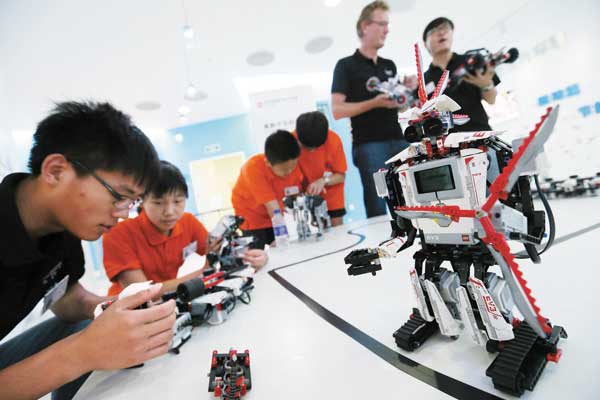 |
|
Students show interest in the robot series, EV3, produced by Lego, the largest educational robot provider in China at the toy's launching ceremony. Provided to China Daily
|
Zhang Hang, 12, stares at a robot that moves around cleverly on the stage.
Shaped like a truck, the robot stands about 20 centimeters high, and moves at the command of an operator, who gives orders using a wireless controller attached to his hand.
"Robots are so cool," Zhang says at the launching ceremony of a new toy giant under Lego's educational robot series, EV3.
"I cannot wait to start my middle school, because my middle school will have robot classes."
When school reopens in September, Zhang will be enrolled in Beijing No 12 Middle School, which is famous for its robot courses.
Just like Zhang's school, many primary and middle schools in China have been providing robot education to students in recent years.
Although there are no reliable national statistics, according to Lego, the largest educational robot provider in China, there are now more than 20,000 schools in most of the provinces using their robots to offer classes to students. There are also 69 after-school educational robot centers in 24 cities that have 10,000 family memberships.
Besides, there are also various other domestic and foreign educational robots, such as Grandar Robotics, and Fishtech.
"I don't know how many primary and middle schools provide robot education nowadays, but I'm sure the number has been increasing very quickly in the past years," observes Wang Jihua, a senior robot teacher in Shanghai Shixi School, which started the first robot class for schools in Shanghai in 1999.
The increase has become accelerated since 2003, when the national educational authority included artificial intelligence introduction and basic robot designing knowledge as part of standard optional courses for middle schools, Wang adds.
There may be different brands and prices, and the items differ for various age groups, but a standard set usually contains intelligent bricks or blocks with computerized sensors, remote controller and an explanation booklet.
In a robot class, teachers cover topics such as what robots are and how they work, and divide students into groups to design and assemble robots.
We recommend:
